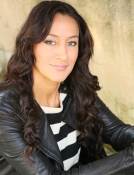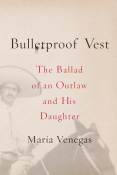An Indies Introduce Debut Author Q&A With Maria Venegas

Maria Venegas is the author of the memoir Bulletproof Vest: The Ballad of an Outlaw and His Daughter (Farrar, Straus and Giroux), a featured title in the 2014 Summer/Fall Indies Introduce promotion. Venegas was born in the state of Zacatecas, Mexico, and immigrated to the U.S. when she was four years old. She currently lives in New York City, where she works as a mentor at Still Waters in a Storm, a reading and writing sanctuary for children in Brooklyn. Bulletproof Vest was excerpted in Granta and The Guardian, and Venegas’ short stories have appeared in Ploughshares and Huizache.
 “Maria Venegas tells the story of her complicated relationship with her estranged father with an honesty and tough vulnerability that is compelling and moving,” said Adrian Newell of Warwick’s in La Jolla, California. “From the poetic prose of the opening prologue describing the late night ambush that almost takes her father’s life to the description of being awakened as a child by the sound of gunshots, readers know immediately that hers was a childhood far from the norm. A remarkable debut by a brilliant young writer!”
“Maria Venegas tells the story of her complicated relationship with her estranged father with an honesty and tough vulnerability that is compelling and moving,” said Adrian Newell of Warwick’s in La Jolla, California. “From the poetic prose of the opening prologue describing the late night ambush that almost takes her father’s life to the description of being awakened as a child by the sound of gunshots, readers know immediately that hers was a childhood far from the norm. A remarkable debut by a brilliant young writer!”
Has writing Bulletproof Vest helped you better understand your father? What do you think his reaction to it would be?
Maria Venegas: When I first set out to write Bulletproof Vest, I really wanted to write a work of nonfiction that would read like a novel based on my father’s life. I felt the stories he had shared with me lent themselves to a more novelistic approach. While writing the book and weaving his story and my story together, I ended up making discoveries that shed light on how he was wired. When I was a child, I often felt it was unfair we had ended up with a lunatic for a father, but in writing about him, I realized that there was a deeply rooted logic to why he acted as he did.
My father didn’t know I was writing a book about him, but he did know I had written a few short stories about him. When I first told him about the short stories, he seemed a bit apprehensive, though he really warmed up to the idea when I said how much I had been paid for those pieces. He loved the fact that I had made “a buck for myself” based on his stories. He even suggested I bring a notebook and pen along on my next visit, as there were a lot more stories where those came from. I thought I’d take him up on it, but never got the chance. Unfortunately, he died under very difficult circumstances six months after I sold the book. I think if he knew that I actually wrote an entire book about him, he’d be thrilled and proud. Very, very proud.
Your debut deals with controversial topics such as immigration, abortion, rape, cultural identity, and gender roles. How do you think literature helps to facilitate discussion on these issues?
MV: Far too often, we hear about these topics in the media, and usually they are discussed or debated by politicians who have no firsthand experience in the matter. Literature is a powerful tool. Novels have long been alternative forms of history, a way to tell personal narratives, stories you’re not going to find in newspapers or history books. I feel it’s important that we tell our personal stories, that they become woven into the discussion, and into the web that will become our history.
Can you tell us more about Still Waters in a Storm, a reading and writing sanctuary for children in Brooklyn?
MV: Still Waters is a nonprofit organization founded by Stephen Haff in 2008, and it exists mainly due to generous grants from organizations such as The Keeler Foundation and others. I first came to Still Waters as a visiting author for one of their Saturday writing workshops. While I was there, I read a short piece called “The Devil’s Spine,” which had just been published in Ploughshares. The piece was about a four-year-old girl on a bus that was snaking around the mountain tops and through the clouds, and though the girl was nauseous, she was being quizzed. There was a name she had to memorize, a name she had to give the men in uniforms when she reached the border and they asked what her name was. If she gave the wrong answer, she’d never see her parents again. Many of the kids that come to Still Waters are themselves immigrants, or the children of immigrants, and so they really responded to the piece. After reading them the story, I gave them a few writing prompts, and I was astounded by the stories they came up with. Not only were they heartfelt and brave pieces, but while each child read out loud, all the others sat quietly and listened — it was beautiful. I felt as though I had stumbled upon a treasure trove. Here was a place that I had often dreamt of creating — a reading and writing sanctuary for children dealing with adverse circumstances. I knew I had to be a part of it. I think it’s important for these kids to know that they have a voice, and that what they have to say matters.
What are your thoughts on diversity in literature, and how do you think this affects interest in reading and writing?
MV: I think as readers, we’re drawn to stories that in some way reflect our own experiences. One of the girls I mentor at Still Waters kept raving about Esperanza Rising, and since I didn’t get around to buying the book fast enough, she ended up loaning me her copy, which was all marked up. It was fun to read her copy with her notes in the margins, where she had starred or marked things that were especially familiar to her. She’s a very talented writer, and I hope that someday she’ll grow up to write her own stories. I think the more diversity there is in literature, the wider the scope, the more beautiful the tapestry we will leave to our offspring.
Are you working on anything now?
MV: I’m currently working on two projects, a collection of short stories and a novel. There are a handful of stories that didn’t make it into the book, mainly because they didn’t feed into the overall narrative, but I’ve been revising them and think they’d make a lovely collection of short stories. The novel is a newer project. It’s set in New York and the Yucatan, and it links the disappearance of the honeybees to the story of a young girl whose father is a beekeeper in the jungle.
Thank you for supporting indies by putting the IndieBound buy button first on your website! When you travel, do you often stop at bookstores? Any particular indies make a lasting impression?
MV: I make it a point to purchase all of my books from independent booksellers, whether in my area or online, for the same reason I buy my food at the farmers’ market (whenever possible) — it’s my one-man protest against the corporate machine. I don’t travel that often, but when I do, I’m the ultimate minimalist, and thus I tend to avoid bookstores (sorry!), but I know that if I walk in, I’ll walk out with at least five books.
If you were a bookseller for a day, what book would you want to put in every customer’s hand?
MV: Light in August by William Faulkner. Reading that book was sort of life-changing for me. While I was writing Bulletproof Vest, I was really struggling with how to handle some of the heavier material — the violence, the machismo, and even the religion. When I read Light in August, I was especially struck by how the characters were so familiar, so similar to my characters, though the novel is set in the Deep South. As a writer I learned a lot from that book, though I think I would put it in the hands of readers for the sheer poetic beauty of the language.
If you could invite three authors (past or present) to a dinner party, who would they be? What do you think would be the topic of conversation?
MV: Sor Juana Inés de la Cruz, Gabriel García Márquez, and William Faulkner. I think it would be really fun to drink a bit of tequila with them, and let the conversation go where it may.
Bulletproof Vest: The Ballad of an Outlaw and His Daughter by Maria Venegas (Farrar, Straus and Giroux, Hardcover, 9780374117313). Publication Date: June 17, 2014.
Learn more about Maria Venegas at mariavenegas.com.
ABA member stores are invited to use this interview or any others in our series of Q&As With Indies Introduce Debut Authors in newsletters and social media and in online and in-store promotions. Please let us know if you do.

